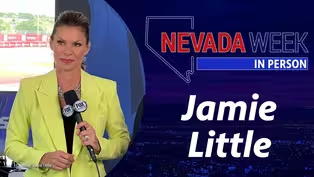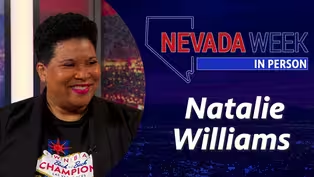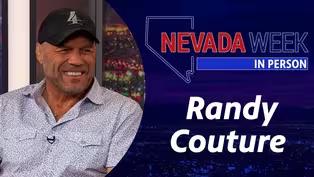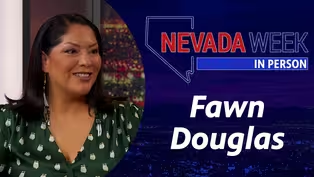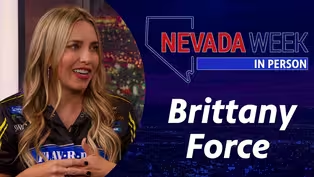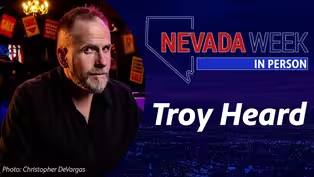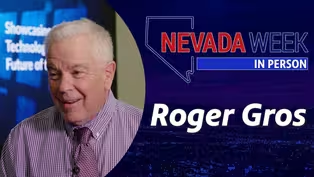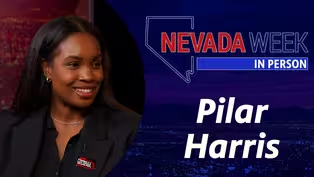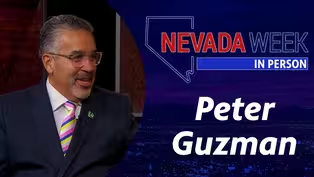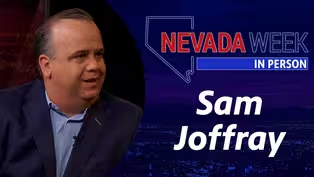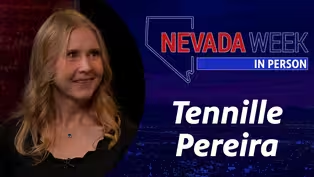
Sharon Linsenbardt
Season 1 Episode 87 | 14mVideo has Closed Captions
One-on-one interview with Sharon Linsenbardt, Owner, Las Vegas Farm and Barn Buddies Rescu
One-on-one interview with Sharon Linsenbardt, Owner, Las Vegas Farm and Barn Buddies Rescue
Problems playing video? | Closed Captioning Feedback
Problems playing video? | Closed Captioning Feedback
Nevada Week In Person is a local public television program presented by Vegas PBS

Sharon Linsenbardt
Season 1 Episode 87 | 14mVideo has Closed Captions
One-on-one interview with Sharon Linsenbardt, Owner, Las Vegas Farm and Barn Buddies Rescue
Problems playing video? | Closed Captioning Feedback
How to Watch Nevada Week In Person
Nevada Week In Person is available to stream on pbs.org and the free PBS App, available on iPhone, Apple TV, Android TV, Android smartphones, Amazon Fire TV, Amazon Fire Tablet, Roku, Samsung Smart TV, and Vizio.
Providing Support for PBS.org
Learn Moreabout PBS online sponsorshipMore from This Collection
Nevada Week In Person goes beyond the roundtable discussion of Nevada Week with guests for a more casual conversation about their personal passions, new projects and compelling stories that are overlooked in the flurry of the news cycle.
Nevada Week In Person | Jamie Little
Video has Closed Captions
One-on-one interview with Jamie Little, NASCAR Broadcaster (14m)
Nevada Week In Person | Chet Buchanan
Video has Closed Captions
One-on-one interview with Chet Buchanan,Host & Creator, 98.5 KLUC’s The Chet Buchanan Show (14m)
Nevada Week In Person | Natalie Williams
Video has Closed Captions
One-on-one interview with Natalie Williams, General Manager, Las Vegas Aces (14m)
Nevada Week In Person | Randy Couture
Video has Closed Captions
One-on-one interview with Randy Couture, UFC Hall of Famer & U.S. Army Veteran (14m)
Nevada Week In Person | Fawn Douglas
Video has Closed Captions
One-on-one interview with Fawn Douglas, Artist and Activist, Nuwu Art (14m)
Nevada Week In Person | Brittany Force
Video has Closed Captions
One-on-one interview with Brittany Force, World Champion Drag Racer (14m)
Nevada Week In Person | Troy Heard
Video has Closed Captions
One-on-one interview with Troy Heard, Artistic Director, Majestic Repertory Theatre (14m)
Nevada Week In Person | Roger Gros
Video has Closed Captions
One-on-one interview with Roger Gros, Publisher, Global Gaming Business Magazine (14m)
Nevada Week In Person | Pilar Harris
Video has Closed Captions
One-on-one interview with Pilar Harris (14m)
Nevada Week In Person | Peter Guzman
Video has Closed Captions
One-on-one interview with Latin Chamber of Commerce Nevada President & CEO Peter Guzman (14m)
Nevada Week In Person | Sam Joffray
Video has Closed Captions
One-on-one interview with Sam Joffray, President & CEO, Las Vegas Super Bowl LVII Host Com (14m)
Nevada Week In Person | Tennille Pereira
Video has Closed Captions
One-on-one interview with Tennille Pereira, Director, Vegas Strong Resiliency Center (14m)
Providing Support for PBS.org
Learn Moreabout PBS online sponsorshipA longtime Las Vegas farmer who rescues abused farm animals, Sharon Linsenbardt is our guest this week on Nevada Week In Person.
♪♪♪ Support for Nevada Week In Person is provided by Senator William H. Hernstadt.
-Welcome to Nevada Week In Person.
I'm Amber Renee Dixon, joining you from The Las Vegas Farm, which has been open to the public since 1968, and in 2012 also became home to Barn Buddies Rescue, a nonprofit dedicated to the rescue of abused farm animals.
And the woman in charge of it all is Sharon Linsenbadt.
Sharon, thank you for joining Nevada Week In Person.
(Sharon Linsenbardt) Good morning.
We're glad you're here.
Thanks for coming.
-We're happy to have you.
So this farm was established in 1961.
Tell me about your history in Las Vegas and your family's?
-Well, my family came here around 1918.
We've been here a long time.
My family was in electrical contracting.
They had Acme Electric, which set all kinds of street lights and polls and hotels and was very instrumental in bringing power to Las Vegas.
So when the lights are on and everybody admires the lights of Las Vegas, my family had an awful lot to do with that.
-How did the farming come to be?
-Farming came strictly from me.
Nobody else in my family had the love or the dedication for animals that I did.
And I've always wanted to be part of animals lives.
And as the town grew, they came through the city and through eminent domain, forced me out of my city dwelling, which forced me to come out.
And because I had a horse, chickens, and things of that nature, we came out far from the city.
When we came out here in the '60s, late '70s, maybe late '70s when we came out, and, you know, we were always out here on dirt.
But as the city grew and we decided to allow people in from-- we just became more and more open to public.
And from the '60s, when I got out of high school, we've done nothing but take care of animals here, care for animals here, love animals here, and be a part of animals' lives here on the farm.
-That's so unique that this is not a farm in your family's history; you started it.
And you've been quoted as saying that "My love for these animals exceeds my love for humans."
-Absolutely 100%.
-Why is that?
-100%.
Animals in my life every day.
Animals as a part of my morning, noon, and night.
Animals on my mind 24 hours a day.
Animals are what give me life, what give me purpose, what gives me joy, what gives me love, which animals are just a part of who I am.
And that's the way it's always been and will always be.
-Do you remember a moment when you were a child when you felt super connected to a pet, for example?
-Ever since I was young, I was trying to save.
My dad was a horrible hunter.
And I don't say don't hunt.
I just say don't hunt and let me see it.
You know, it's not something I enjoy.
And he'd bring home these animals, and I'd try to revive them when I was tiny.
And it just broke my heart.
From that point forward, I started saving, caring for, protecting, whether it was a grasshopper in a little wooden box or a spider or whatever.
A bat-- my mother would go nuts when I'd bring a snake or a bat home.
Those were parts of Las Vegas that were a part of my daily life.
And when Las Vegas was young and I was young, they were just what I did and what I do.
-So fast forward, and you are reviving and saving animals through Barn Buddies Rescue.
For some who might think in a city like Las Vegas, what is the need for a rescue for farm animals?
What would you say?
-Huge.
Absolutely huge.
Pigs, chickens, any kind of-- horses, goats, rabbits.
Rabbits, oh, my God.
It just goes on and on about the animals that people bring into this city.
-Are they coming from farms or from people's homes?
What are you-- -Typically they come from a home.
Typically they-- the only time we'll get one-- people that have been on farms, people that have been having their own animals in their own backyard typically have enough love and concern for them to take them with when they change homes or change locations.
As long as their health and their life allows that to happen, most of those types of people will take them with.
The ones that we are coming up against are city dwellers, city people that all of a sudden got an animal and as it grows and it gets a little bit bigger, they just don't want to care for it.
They don't want to take take the time, they don't want to take the money, they've outgrown it, and that's what's really sad, really sad.
You've got to have a commitment for the life of the animal when you bring one into your home.
If you're not going to do that, don't bring one into your home.
-What are the most common calls you're getting of people wanting to get rid of their animals?
What kind of animals?
-Pigs, rabbits, roosters-- that's mostly what I get: pigs, rabbits, roosters.
And for this city to have our parks overwhelmed with rabbits and roosters-- the pigs, the poor pigs, they end up at the animal shelter.
Typically they get put down.
They're not-- there's just not enough homes, not enough homes.
And right now, why would you bring something into the world?
Don't hatch it.
Don't breed it.
Don't bring it in.
Don't bring it in from another city or state and then bring it into Las Vegas and not have the thought, the ability, the care, the time, the money, the place, whatever it takes to take care of that animal for the rest of its natural life.
-What are you hoping people take away when they visit The Las Vegas Farm?
-When people come here, we want the children and the adults to come away with kindness, come away with-- treat animals with respect.
Treat animals with kindness.
Don't bully.
Come in here and understand what it takes to take care of an animal.
The cost is enormous in Las Vegas.
We don't have a cornfield or a hay field down the street.
-What are you spending on costs per month?
-We're at about 12,000 a month just for feed.
That's just the larger animals.
Just for feed.
That's not our straw, our bedding, our corrals that need to be replaced, our well parts, our whatever it is that we've got to do to take care of these animals.
-And how are you affording all this?
-It's almost impossible without the community support.
We have our Farmers Market every Saturday and Sunday from nine to four.
We sell our products here that we typically grow.
But I have an awful lot of community growers that live around me.
Some will have 10 fruit trees in their yard.
Some will grow watermelons.
Some will grow whatever.
And they'll bring them over here and make them be a part of The Farm so we can market them and sell them.
-Their form of donations?
-Their form of donation, absolutely, because I can't possibly do everything I used to be able to do to be able to keep this running and affordable and pay for all the costs that we have here without the community support.
We have to have the community.
[rooster crows] -Weddings, birthday parties, field trips, that also takes place here.
-It does.
Field trips are really important because we get the youngsters.
Not only do we teach the youngsters, we teach the teachers.
And the teachers are always so excited to bring their kids here and be able to educate the kids about what we do, how we do it.
Don't breed.
Don't do anything within an animal-- in your home that isn't going to last for the lifetime of that animal.
-And you're also sharing the stories of abuse that these animals have gone through?
-I do.
Every animal on our property comes to us because of abuse.
I don't take them in because you're tired of cleaning a cage or you're leaving, you're leaving home and all of a sudden you don't want to care for it anymore or your daughter went off to college, and who's going to take care of the bunny.
I don't take in those types of animals.
-Even though you get those calls all the time.
-All day long.
All day long.
One of my first questions is always, Why do you have the animal?
Where did it come from?
How did you get it?
And when I hear those stories of disrespect for the animal, I say, You know, you got to call the Animal Foundation.
You got to call another rescue here in town.
Because what I'm here for are those animals that are hurt, abused, beaten up, neglected in such a situation in their life where they're not going to survive without me.
And I think it's important to allow them to survive and to teach people what happens to an animal that's been abused.
I think it's important.
-Last thing before we go and look at some of these animals and hear their stories.
What happens to The Farm when you're no longer here, Sharon?
-That's-- Amber, that's top of mind every day for me right now.
The older I get, the more mature I get.
And everybody's been telling me for years, Sharon, what's going to happen?
I say, You know, I'm only 70.
I'm only 75.
But I have to concern about it now.
I have to look at the perpetuity of The Farm.
I can't imagine Las Vegas losing what we've developed here.
I think it's important for the community.
I think it's important for the children.
I think it's important for everyone to have this respite, to have this place of quiet and peace and learning, and to get away from the city for a moment.
You can't imagine how many people walk in the gate, and immediately it starts: My grandmother did... or My aunt did... or When I was a child I did... And they're able to teach their children about their history and their life and what they did.
It's a family thing that needs to stay in this valley.
So right now I'm trying to find a successor.
I'm trying to get the foundation and to get the wills and trusts and all that attorney stuff that needs to happen.
We cannot lose The Las Vegas Farm.
This city cannot lose The Las Vegas Farm.
-Well, let's go look at some of the reasons why this city can't afford to lose this farm.
-Thank you very much.
-All right.
So, Sharon, who is this?
-This is Billy Boy.
This is our lovely, lovely Billy.
So when you talk about where did the animals come from, typically these cows come from a butcher-type situation, which isn't something that we want to hear or that we enjoy.
And oftentimes, they will raise them by a family.
And that family will then butcher for their family food, which is so common in the Midwest and in the rest of the country.
That's what you do.
-And how did you-- -You get six- and seven-year-old little girls that are feeding Billy for six, eight, ten months, and all of a sudden they say, Oh, today's the day.
Not happening!
So those are the kinds of heartfelt, wonderful stories that I love.
-And that's what happened in his case?
-Exactly.
They said, Daddy, we can't do it.
Daddy said, What are we to do with a cow?
Well, here we go.
-Sharon, who is this?
-This is Backy.
Backy has come to us because he's blind.
The people that had him we're gonna put him down because he was blind.
And again a situation where they couldn't do anything with him other than put him down because they were leaving town.
How do you find a place for a blind horse?
Pretty much impossible.
But why would we want to put down a blind horse?
Why would we want to put down a blind horse?
So Backy is here with us, blind or no blind.
He's here with us to spend the rest of his days with us.
He's kind.
He's gentle.
We've had little kids come out here and adults come out here that were blind.
They are drawn to Backy like you can't believe, and they have an understanding between each other.
But the kids love him, the parents love him, we love him, and he's such a big, big presence and a big personality.
So Backy is now a part of The Farm.
He's a beautiful animal.
He's very handsome, he's very sweet, and he plays up when everybody brings him his bags of hay.
He can hear real good.
So he hears those bags, and out he comes.
So Backy, even though he's blind, is very important to us and to The Farm in general.
We just love him.
-All right.
Sharon, tell me about this alpaca?
-Alpaca.
-Okay.
-These are our little alpaca girls and boys.
We have Danny, Daisy, and Debbie.
-Okay.
-And all three of these alpacas came to us from a situation where a woman had passed away.
Probably what occurred with her legs was either poor breeding or poor food, poor nutrition when she was young.
Her legs are so deformed.
-Wow!
-Anybody else would have put her down.
When the vet first came to see her the first day she was here, he said, Sharon, don't grow to love this one.
She can't last.
So we had an amazing man come and make braces for her.
And we had braces made and molded to her legs so that when we let her out, she's not going to tear that tendon or make that joint fall apart.
And with the braces and with our care and with our concern, we'll be able to have her live a nice, normal life, as normal life as she can with that kind of infirmity.
-They have a home here at The Las Vegas Farm.
Sharon Linsenbardt, thank you so much for joining Nevada Week In Person.
-We are so grateful you were here.
Thank you.
Thank you.
Thank you.
Very grateful.
♪♪♪

- News and Public Affairs

Top journalists deliver compelling original analysis of the hour's headlines.

- News and Public Affairs

FRONTLINE is investigative journalism that questions, explains and changes our world.












Support for PBS provided by:
Nevada Week In Person is a local public television program presented by Vegas PBS
